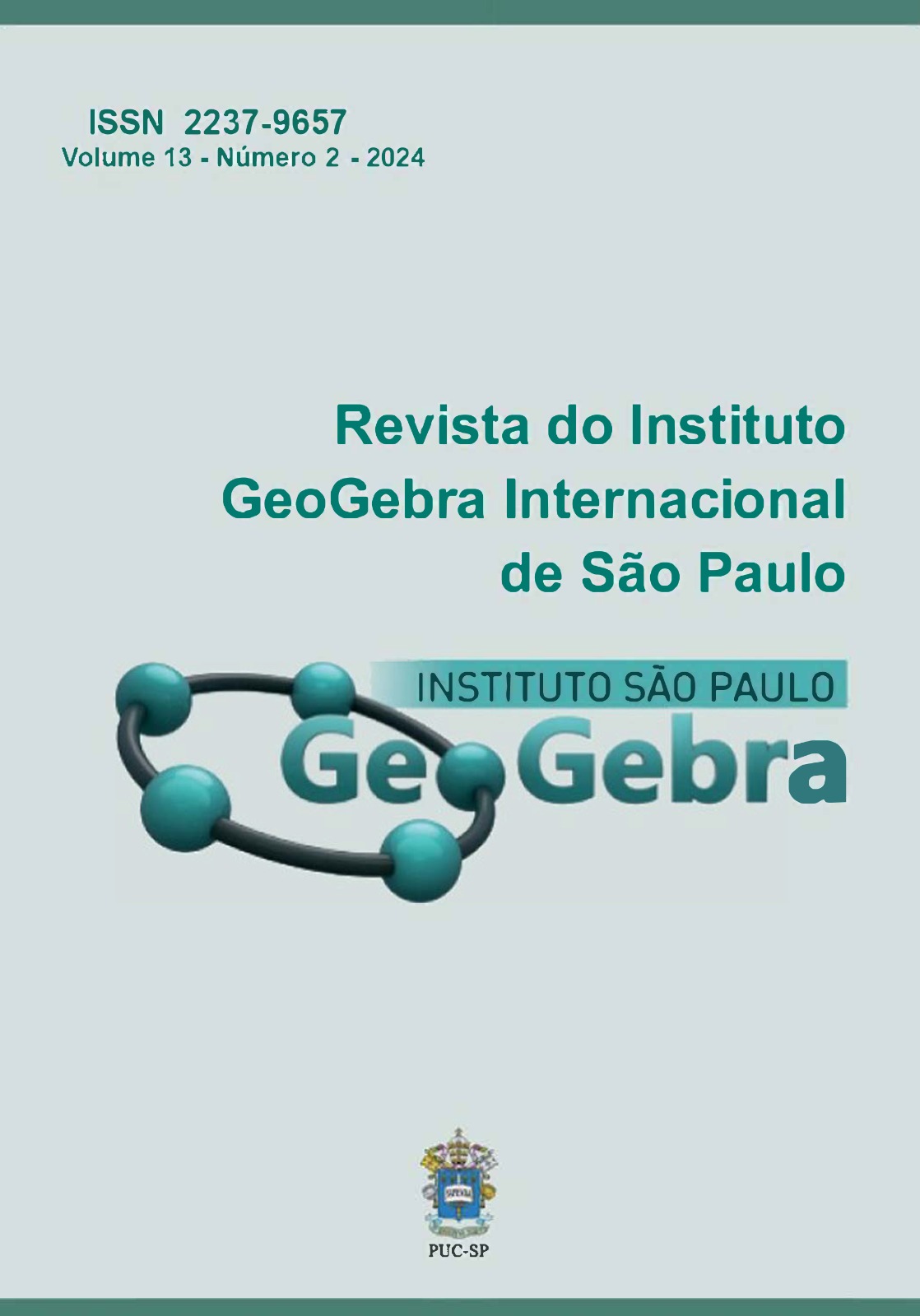Teaching Spatial Geometry through Geogebra:
an experience involving the Euler relation
DOI:
https://doi.org/10.23925/2237-9657.2024.v13i2p005-015Keywords:
Mathematics Education, GeoGebra, Euler RelationAbstract
Digital technologies are like a tool that can streamline the teaching and learning process, as it facilitates understanding through the visualization of elements that refer to the concepts that involve the contents of Geometry. In view of this, the present work aims to present a possibility of teaching spatial geometry for a high school class through Geogebra. We approach the content of Spatial Geometry with emphasis on the Euler Relation. The work was developed in a constructionist approach according to Papert. We used the teaching methodology called Exploratory Teaching, which consisted of developing a class through a task. We identified that the use of GeoGebra contributed to the understanding of the addressed content. We noticed that experiences like this become relevant for the teaching of mathematics, enabling teaching alternatives for the mathematics teacher.
References
ALVES. T. S.; SIMÕES. B. MIOLA. A. F. S. O Uso do Geogebra em uma Perspectiva Colaborativa: uma proposta para o ensino do Teorema de Pitágoras à luz do sócio construtivismo. Revista Eletrônica de Educação Matemática -REVEMAT, Florianópolis, v. 18, p. 01-20, jan./dez., 2023
BORSOI, C. GeoGebra 3D no Ensino Médio: uma possibilidade para a aprendizagem da Geometria Espacial. 2016. Dissertação de Mestrado em Ensino de Matemática – UFRGS, Porto Alegre, 2016. Disponível em < https://lume.ufrgs.br/handle/10183/148179> Acesso em: 02 de abril. de 2022.
BRASIL. Ministério da Educação. Secretaria de Educação Básica. Base Nacional Comum Curricular. Brasília: MEC, 2018.
CARVALHO, S. F.; SCHERER, S. Possibilidades construcionista com lousa digital: diálogos a partir de uma aula de abordagem instrucionista. Revista Intersaberes, v. 15, n. 34, 2020.
CANAVARRO, A.P.; OLIVEIRA, H.; MENEZES, L. Práticas de Ensino Exploratório da Matemática: O Caso de Célia. In: Encontro de Investigação em Educação Matemática 2012: Práticas de ensino da Matemática, p.255-266, 2012.
CANAVARRO, A.P. Ensino Exploratório de Matemática:Práticas e desafios. Educação e Matemática.Lisboa, n.115, p.11-17, nov/dez 2011
DEZIN, N. K. ; LINCOLN, Y. S. (Orgs). O planejamento da pesquisa qualitativa: teorias e abordagens. 2. ed. Porto Alegre: Artmed, 2006.
FIGUEIREDO, T. D.; SALMASIO, J. L.; RAGONI, V. F. Um discurso sobre as tecnologias digitais na formação de professores de matemática. Ensino da Matemática em Debate, v. 4, n. 2, p. 145-160, 2018.
LEITE, A. C. P. MIOLA, A. F. S. Contribuições do GeoGebra para o Ensino de Funções: o que revelam algumas pesquisas brasileiras? Revista de Iniciação à Docência, v. 8, n. 1, 2023.
MIOLA, A. F. S.; PINHEIRO, M. G. C.; SANTOS, E. V. Estágio Supervisionado: uma Aula na Perspectiva do Ensino Exploratório para Construção do Pensamento Algébrico no Ensino Fundamental. In: Ensino de Matemática: desafios e possibilidades (org) GUALANDI, J. H. – 1.ed. – Curitiba-PR: Editora Bagai, 2021.
PAPERT, S. A máquina das crianças. Porto Alegre: Artmed, v. 17, 1994.
RUTHVEN, K.; HOFMANN, R.; MERCER, N. A dialogic approach to plenary problem synthesis. In: Proceedings of the 35th Conference of the International Group for the Psychology of Mathematics Education. p. 81-88. 2011.
STEIN, M. K; SMITH, M. S. Mathematical tasks as a framework for reflection: From research to practice. Mathematics Teaching in the Middle School, 3, 268–275. 1998.
STEIN, M. K; ENGLE, R. A; SMITH, M. S; HUGHES, E. K.. Orchestrating productive mathematical discussions: Helping teachers learn to beer incorporate student thinking. Mathematical Thinking and Learning, 10(4), 313-340. 2008.
Downloads
Published
How to Cite
Issue
Section
License
Copyright (c) 2024 Revista do Instituto GeoGebra Internacional de São Paulo

This work is licensed under a Creative Commons Attribution 4.0 International License.
Submission, processing, and publication of articles sent to the journal and registration of the DOI at Crossref is free of charge.
Authors retain their copyright and grant the journal the right of first publication of their article, which is simultaneously licensed under a Creative Commons - Attribution 4.0 International license CC BY that allows others to share the article by acknowledging its authorship and initial publication by the journal.
The GeoGebra journal encourages its authors to register their work with information and communication management systems aimed at researchers, such as Academia.edu, Mendeley, ResearchGate, etc.


 10.23925
10.23925
